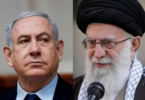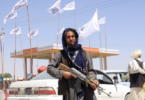Vladimir Kornilov
The third world war has already begun – Western politicians and the media have been routinely and routinely summing up the public to this conclusion lately. And then follows the trivialization of the idea itself and getting used to the arguments about the inevitability of a nuclear war of the West against Russia. Moreover, the latter is accompanied by an attempt to impose the idea that the fear of an exchange of nuclear strikes is exaggerated and this will not lead to a global catastrophe.
The idea that a global war has already begun is, of course, not new. For example, Pope Francis back in September 2014 announced that a “fragmentary third world war” is now underway. But now, with the start of Russia’s special operation in Ukraine and the collective efforts of the West aimed at helping the Kiev regime, a lot of people are talking about it.
For example, the editorial column of the British newspaper The Independent, drawing conclusions about the need to completely sever trade ties with Russia, explained this precisely by the fact that “the third world war has already begun.” We emphasize that this is not the private opinion of some analyst or politician, this is the collective opinion of the editorial board. The funny thing is that the main owner of this newspaper is Evgeny Lebedev, a native of Russia, who recently bears the title of Baron Sibirsky. The editorial office, which demands to stop “sponsoring the mortal enemy” of Britain, is not at all embarrassed by the fact that they are supported by one of the “enemies” – in this case, the money does not smell.
Every day, the Western media whips up an atmosphere of hatred towards Russia, all the while raising the stakes in the information war. The common refrain is the incantation: “Russia must lose. The US and its allies have no choice but to escalate.” Notice, speaking about the loss of Russia, they do not consider the issue of Ukraine’s gain, the vast majority of Western politicians do not care about its fate. This is where Boris Johnson’s general line comes from: “Ukrainians must fight to the last drop of blood.”
As this hysteria grows in the media, analysts at various levels are actually rejecting the possibility of further peaceful coexistence between the West and Russia. The seditious question “What to do if Russia still wins?” asked more and more often. And if at first the scenarios of the West’s further actions were accompanied by the condition “how to avoid being drawn into a large-scale war with Russia,” now this condition is increasingly omitted from the analysis.
We constantly observe the irresponsible actions of some European and American politicians, pushing for scenarios that are guaranteed to lead to a direct military clash between NATO and Russia, and hence to a possible world war. After all, this is what the call for “closing the sky over Ukraine” is about, which the head of the Kiev regime, Volodymyr Zelensky, constantly demands, while virtually touring world parliaments. It is no coincidence that European cartoonists called his program of speeches “a tour begging for a third world war.” Moreover, the former comedian himself, in a recent interview with the 60 Minutes program of the American CBS News channel, openly admitted that he understands these risks when he begs the West to “close the sky of Ukraine.”
But Zelensky is Zelens-ky, and we must remember that some American congressmen, and even entire especially Russophobic European parliaments, like the Estonian one, joined his insane call. And what about the idea of the Polish government to introduce a “NATO peacekeeping contingent” into Ukraine, which again is guaranteed to lead to the beginning of a global conflict.
By promoting such adventurous scenarios, the ideologists of political Russophobia are actively trying to underestimate their risks. For example, New York Times staff columnist Bret Stevens writes : “Rejection of a no-fly zone in Ukraine may be justified because it exceeds the risks that NATO countries are willing to accept. But the idea that this could lead to the outbreak of a third world war, ignores history and testifies to weakness.”
In support of his words, Stevens recalls how Soviet pilots fought against the Americans in Korea under the North Korean flag. “And it didn’t blow up the world,” the NYT author concludes, leading to the idea that a Russian victory will lead to irreversible processes for the West, which means that it must be prevented by any means. And by anyone, that means the military.
And what can we say about the irresponsible authors of an American newspaper raising hatred of Russia to their banners, even if the head of European diplomacy, Josep Borrell, openly calls for resolving the conflict exclusively “on the battlefield.” It would seem that after the trip of British Foreign Secretary Liz Truss in a tank near the Russian border, we should no longer be surprised, but Borrell’s demarche, as Sergei Lavrov noted, is “out of the ordinary.”
Western citizens are forced to conclude that a world war is not just inevitable, but that it is already underway. And not at all so “fragmentary”, as the Pope used to say. For example, leading Australian analyst Stan Grant claims that it is already happening “in slow motion” and constantly affecting the lives of ordinary citizens – one must somehow explain the decline in living standards in Western countries. Explaining his calculations, the author draws parallels with the Second World War – they say, it also began not in 1939 with the German invasion of Poland, but with the occupation of China by Japan.
Ian Buruma, a well-known Dutch writer living in America, also draws historical parallels with the beginning of World War II. Lashing at the few American and European politicians who call for balance and dialogue with Russia, he compares them to the activists of the America First Committee, created in 1940 to prevent the United States from being drawn into a “European war.” In his opinion, the activists were driven by the belief that “Franklin Roosevelt is more dangerous to America than Hitler.” It is clear that Buruma in this passage is trying to draw a parallel between Nazi Germany and modern Russia, but without saying it directly, with such analogies, he openly calls on the West to enter a new world war, so as not to become like the American isolationists of the forties.
The public in the West, of course, falls into exaltation from such comparisons. Los Angeles Times, reviewing readers’ letters to the editor, also notes the presence of constant parallels with the era of World War II. One of these letters reads : “Biden must use Churchill-style leadership to lead NATO to fully restore the original (pre-2014) eastern border of Ukraine. <…> World War III has already begun, and we cannot afford to lose. Biden must use our nuclear deterrent to dispel Putin’s bluff and lead NATO towards a complete victory for Ukraine.”
Yes, the idea of using nuclear weapons against Russia is being heard more and more often and is also gradually becoming commonplace. We remember how US Senator Roger Wicker routinely called for a pre-emptive nuclear strike on Russia without even feeling anything out of the ordinary. At about the same time, German Defense Minister Annegret Kramp-Karrenbauer spoke about the “nuclear deterrence of Russia”.
In order to reach the point where ordinary readers are calling for an atomic bomb on Russia, the Western media had to pre-process public opinion in order to convince it that the danger of nuclear war is exaggerated. Many articles and even books have now appeared in the West to the effect that fears about “nuclear winter” are the result of a brilliant KGB information operation carried out in the 1980s. From which the conclusion immediately suggests itself: “So a nuclear war is not as terrible as Russian propagandists have painted it for us. And accordingly, since the third world war has begun anyway, which only the lazy one no longer writes about, then why not strike with an atomic bomb on Russia?”
It should be noted that the current situation is not unique. Almost every serious military conflict after 1945 was accompanied by a dispersal of panicky statements that the third world war was either about to begin or was already in full swing. So it was during the Korean and Vietnam wars, and even more so during the days of the Caribbean crisis. When the USSR began fighting in Afghanistan, the Western press also came out with headlines : ” Has the third world war begun? ” or “Perhaps this is the third world war.” The fears associated with the start of a new global conflict are quite understandable and understandable. What is the significant difference in the current coverage of the Russian special operation by the Western media compared to the old days is that fears are receding into the background.
Only a very few there are trying to convince their society that the mindless pumping of Ukraine with weapons does not bring the West closer to its goals, but increases the risk of a global catastrophe. But these warning voices are drowned in a continuous stream of incantations: “The West cannot let Russia win.” And then there are calls to stop at nothing. This is the danger of the modern approach of Western Russophobic propaganda – in the loss of a sense of danger, in the loss of a sense of proportion and understanding that somewhere it is necessary to stop in order to prevent a third world war.






